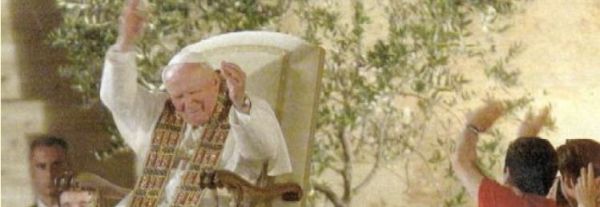(Reading: Lk 1:68-69.76.78-79)
Benedictus
1. Having reached the end of our long journey through the Psalms and Canticles of the Liturgy of Lauds, let us pause to consider the prayer that marks the Office of Lauds every morning. It is the Benedictus, the Canticle intoned by Zechariah, the father of John the Baptist, when the birth of that son changed his life, wiping away the doubt that caused him to go mute, a serious punishment for his lack of faith and praise.
Now, instead, Zechariah can celebrate God who saves him, and he does so with this hymn, set down by Luke the Evangelist in a form that undoubtedly reflects the liturgical usage current in the original Christian community (cf. Lk 1: 68-79).
The Evangelist himself describes it as a prophetic hymn, inspired by the breath of the Holy Spirit (cf. 1: 67). Indeed, we have before us a benediction proclaiming the saving actions and liberation offered by the Lord to his people. Thus, it is a "prophetic" interpretation of history, the discovery of the intimate, profound meaning of all human events that are guided by the hidden but active hand of the Lord which clasps the more feeble and hesitant hands of men and women.
2. The text is solemn and, in the original Greek, is composed of only two sentences (cf. 68-75; 76-79). After the introduction, marked by the benediction of praise, we can identify in the body of the Canticle, as it were, three strophes that exalt the same number of themes, destined to mark the whole history of salvation: the covenant with David (cf. vv. 68-71), the covenant with Abraham (cf. vv. 72-75) and the Baptist who brings us into the new Covenant in Christ (cf. vv. 76-79). Indeed, the tension of the whole prayer is a yearning for the goal that David and Abraham indicate with their presence.
It culminates in one of the last lines: "The day shall dawn upon us from on high..." (v. 78). This phrase, which at first sight seems paradoxical with its association of "dawn" and "on high", is actually full of meaning.
3. Indeed, in the original Greek, the "rising sun" is anatolè, a word which in itself means both the light of the sun that shines on our planet and a new shoot that sprouts. Both these images have messianic value in the biblical tradition.
On the one hand, Isaiah reminds us, speaking of the Emmanuel, that "the people who walked in darkness have seen a great light; those who dwelt in a land of deep darkness, on them has light shined" (Is 9: 1). On the other, referring once again to the king-Emmanuel, he describes him as the "shoot from the stump of Jesse", that is, from the house of David, a shoot upon which the Spirit of the Lord was to rest (cf. Is 11: 1-2).
With Christ, therefore, appears the light that enlightens every creature (cf. Jn 1: 9) and makes life flourish, as John the Evangelist was to say, combining the two realities: "in him was life, and the life was the light of men" (1: 4).
4. Humanity that was engulfed "in darkness and in the shadow of death" is illumined by this dazzling revelation (cf. Lk 1: 79). As the Prophet Malachi had announced: "For you who fear my name, there will arise the sun of justice with its healing rays" (3: 20). This sun "guides our feet into the way of peace" (Lk 1: 79).
So let us move on, taking that light as our reference point; and may our faltering steps which, during the day, often stray to dark and slippery paths, be sustained by the light of the truth that Christ spreads in the world and in history.
At this point, let us listen to a teacher of the Church, one of her Doctors, the Englishman Venerable Bede (seventh-eighth centuries). In his Homily for the Birth of St John the Baptist he commented on the Canticle of Zechariah as follows: "The Lord... has visited us as a doctor visits the sick, because to heal the deep-rooted sickness of our pride, he gave us the new example of his humility; he redeemed his people, for at the price of his blood he set us free when we had become servants of sin and slaves of the ancient enemy.... Christ found us lying "in darkness and in the shadow of death', that is, oppressed by the long-lasting blindness of sin and ignorance.... He brought to us the true light of his knowledge, and banishing the darkness of error, he has shown us the sure way to the heavenly homeland. He has directed the steps of our actions to make us walk on the path of truth, which he has pointed out to us, and to enable us to enter the home of eternal peace, which he has promised us".
5. Lastly, drawing from other biblical texts, the Venerable Bede concluded, giving thanks for the gifts received: "Given that we are in possession of these gifts of eternal bounty, dear brethren... let us also praise the Lord at all times (cf. Ps 34[33]: 2), for "he has visited and redeemed his people'.
May praise be always on our lips, let us cherish his memory and in turn, proclaim the virtue of the One who has "called you [us] out of darkness into his marvellous light' (I Pt 2: 9). Let us ceaselessly ask his help, so that he may preserve in us the light of the knowledge that he brought to us, and lead us onwards to the day of perfection" (Omelie sul Vangelo, Rome, 1990, pp. 464-465).
[Pope John Paul II, General Audience 1 October 2003]












